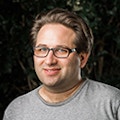
Scott Aaronson is the David J. Bruton Jr. Centennial Professor of Computer Science at the University of Texas at Austin and director of its Quantum Information Center. Previously, he was on the faculty at the Massachusetts Institute of Technology. He studied at Cornell and University of California, Berkeley, and did postdocs at the Institute for Advanced Study as well as the University of Waterloo. His first book, Quantum Computing Since Democritus, was published in 2013 by Cambridge University Press. Aaronson has written about quantum computing for Scientific American and the New York Times, and writes a popular blog. He’s received the National Science Foundation’s Alan T. Waterman Award, the United States PECASE Award, and MIT’s Junior Bose Award for Excellence in Teaching.
Aaronson’s research focuses on the capabilities and limits of quantum computers and more generally on computational complexity and its relationship to physics. Within the context of the It from Qubit Collaboration, Aaronson is extremely interested in the interplay between computational complexity and quantum gravity. This has involved studying the computer-science aspects of the Harlow-Hayden argument, which attempts to apply complexity theory to the notorious “firewall paradox” in black hole information, as well as working with Leonard Susskind to understand the growth of quantum circuit complexity in systems arising from the AdS/CFT correspondence.